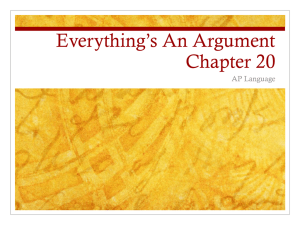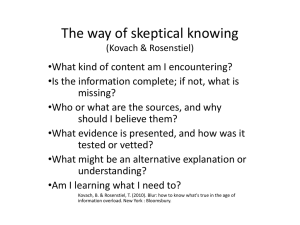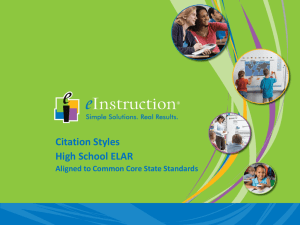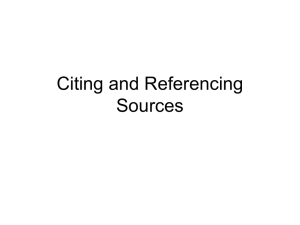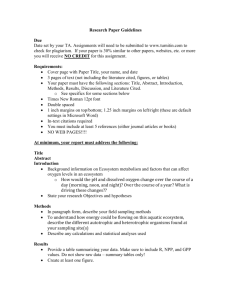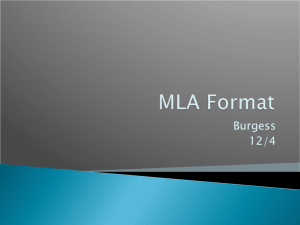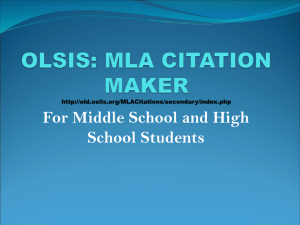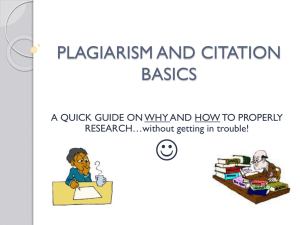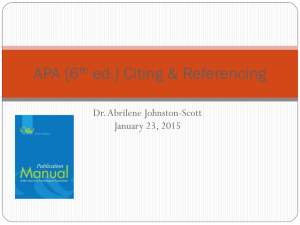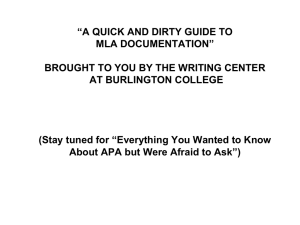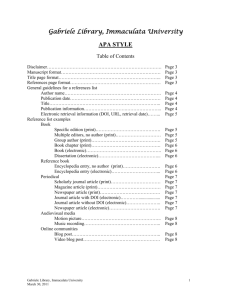APA-Documentation-Style
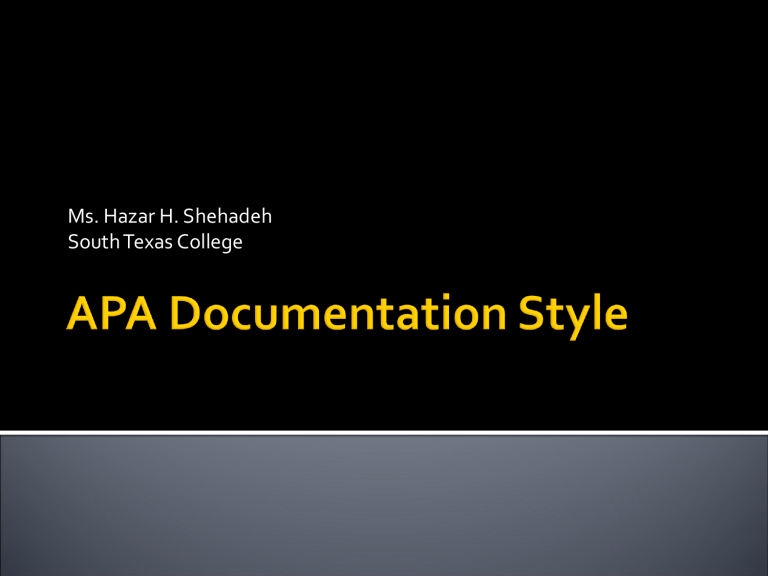
Ms. Hazar H. Shehadeh
South Texas College
-
-
Following this lecture, you should be able to:
Document you paper following the APA format.
Use in-text citation (parenthetical citation) and references list (bibliographic entries) in your paper.
All writers and students who write papers using external sources must document their papers using a specific style to avoid plagiarism.
Plagiarism or academic dishonesty means stealing others’ words and ideas whether word-by-word or paraphrasing into one’s own language and using them without acknowledging the sources.
Any student that plagiarizes on any assignment would be subject to the school’s penalties for such offense. Penalties includes: failure in the course, loss of financial aid privileges, suspension and/or expulsion. Carelessness is not a valid excuse for plagiarism.
Plagiarism of any kind or cheating in any fashion is not tolerated.
1.
Plagiarism can occur when:
Using other people’s words, ideas, and opinions as the students’ own
2.
3.
Paraphrasing other’s words, ideas, and opinions without acknowledging the source
Copying from a source word by word without using quotation marks and in-text citation regardless of including the bibliographic citation (the References page).
To avoid plagiarism, one must cite all the sources using in-text citation and bibliographic citation following the required style.
-
-
The writer should follow a certain guidelines set by this style.
The paper should have a title page, abstract, main body, and references page.
This style has two parts:
In-text citation (parenthetical citation)
References entries (bibliographic entries)
The entire text should be double-spaced using Times New Roman with a font size of 12 pt.
The margins should be set to 1 inch on all sides.
Leave one space after the comma, semicolon, colon, and periods that are used to separate parts of the citations and initials in a person’s name.
Leave two spaces after the period as a terminal punctuation mark (to end a sentence).
The first page of the paper must include a page header in the upper righthand corner including Running head: then the first 3 or 4 words of the paper’s title (in all caps) flush left, and then the page number (Arabic numerals) flush right.
For all the other pages, the header must contain the shorter version of the title flush left in all caps, and the page number flush right.
All titles of other books and periodicals
(journals, magazines, and newspapers) should be italicized or underlined throughout the essay, and titles of articles and webpages should appear in quotation marks (except in the references page).
The first line of each paragraph should be indented one half inch from the left margin.
All the words of the books and articles’ titles should be capitalized within the text (e.g. S uccessful C ollege W riting).
But in the References page, capitalize only the first word of the title and subtitles (e.g. S uccessful college writing). Subtitle means the secondary title that comes after the colon ( E ducating English learners: L anguage diversity in the classroom).
Proper nouns must be capitalized all the times (English,
Shakespeare, Mexican, American..)
The title page should have the page header that includes the words Running head: and then a shorter version of the title in all caps in the left margin, then the page # in the right margin.
The full title of the paper, student’s name
(byline), and the institutional affiliation must be centered in the upper half of the title page
(follow your professor’s instructions for this list).
It must include the page header, and it comes after the title page.
The word Abstract must be centered at the first line, without quotation marks, bold, italics, or underlining.
Provide a summary of the main points of the paper in one single paragraph (less than 250 words).
The first line is not indented.
The basic format of in-text citation is : (Author’s last name, year of publication, page number).
Use p. for one page, pp. for more than one page.
-
-
1. One author:
Rousseau depends on “his highly subjective and masculinist conception” of nature to reserve the balance in society (Trouille, 1997, p. 17).
More than one page: (Trouille, 1997, pp. 17-18).
2. Two authors:
This is because TWB or ESL programs “are quality program designs for standard-based education”
(Calderon & Minaya-Rowe, 2003, p. 6).
3. Three to five authors:
- Since any negotiation of power equation is a political act, feminism is considered a “political attack” (Guerin, Labor, Morgan, Reesman &
Willingham, 1999, p. 196).
The first time you cite the source
- (Guerin et al., 1999, p. 196)
For all other times you cite the same source.
4. Six and more authors:
List the first last name with et al. for all the citations, even the first one.
- (Dranganski et al., 2006, p. 6317)
-
5. Author named within the sentence:
Hake (2006) says that typical characters of post-unification cinema in Germany are
“ well-adjusted, upwardly mobile, reasonably happy, but also incredibly selfcentered men and women
”
(p. 186).
-
6. How to cite when paraphrasing:
When you paraphrase an idea from a source, there is no need to include the page number.
The process of assimilating those students into the new culture would threaten their cultural assertion and native language (Crawford, 2004).
7. Web site:
- It is said that Amiri Baraka
’ s socialist art is
“ addressed to the
-
-
black community, which has, he believes, the greatest revolutionary potential in America
”
(Harris, 1991).
No page numbers
No date available: (Harris, n.d.)
Author unknown: (“The Third World,” 1991)
No date and no author: (“The Third World,” n.d.)
7. Quotes with more than 40words:
APA requires that long quotes (>40 words) to be be double-spaced, indented, and with the quotation marks removed. The period comes before the citation.
Example:
The researchers found that in order to implement e-learning programs, it is essential to:
(a) have a clear vision of desired outcome (i.e. ubiquitous, lifelong, access to higher education); (b) an understanding of the current capacity and attitudes of the relevant staff and (c) a coherent set of steps to move from the current situation to the desired outcome.
(MacKeogh & Fox, 2009, p.152)
The word References must be centered, without quotation marks, bold, italics, or underlining.
This page must have a header and is double-spaced using the same font.
The entries are set to hanging indentation by 0.5 inch.
The entries must be organized in alphabetical order by the authors’ last names. Do not number the entries.
Italicize or underline all titles of books and journals. Do not use quotation marks, italics, or underlining with articles’ titles. Italicize the websites’ titles.
Only the first letter of the first word of the book, article, and webpage’s title and subtitle is capitalized.
Every source cited in the text of the paper should be cited on the
References page.
Citing books: the author
’ s last name, initials. (year of publication). Book title. The city of publication, State: publisher.
1. A book with one author:
Trouille, M. S. (1997). Sexual politics in the enlightenment: Women writers
read Rousseau. Albany, NY: State University of New York Press.
2. A book with two up to seven authors:
-
List all the names
Galderórn, M. E., & Minaya-Rowe, L. (2003). Designing and implementing two-way bilingual programs: A step-by-step guide for administrators,
teachers, and parents. Thousand Oaks, CA: Corwin Press.
3. A work with eight or more authors:
List the first six authors’ last names, then put three periods(ellipsis), and then list the last author’s last name.
Prince, P., Billups, Z., Andrews, K., Bisoux, C., Frasier, L., Grey,
P., . . . Lanikai, H. (2008). Effects of quitting smoking on EEG activation and attention last for more than 31 days an dare more severe with stress, depnedance, DRD2 A1 allele, and depressive traits . Nicotine and Tobacco Research , 6, 249-
267 . doi: 10.1080/14622200410001676305
Page 198 APA 6 th
Citing webpage:
Author’s last name, initials. (year of publication). Site’s
title. Retrieved from http://web address
Harris, W. J. (1991). Amiri Baraka: Biography and historical context . Retrieved from http://www.english.uiuc.edu/maps/poets/a_f/baraka/b io.htm
Citing webpage:
Organization
Organization’s name. (year of publication).
Site’s title. Retrieved from http://web address
South Texas College . (2009). Biology instructor pursues nursing degree to become better teacher, mentor . Retrieved from http://news.southtexascollege.edu/?tag=teac hing-excellence
Citing webpage:
No author, not an organization.
Tile of the web site. (year of publication).
Retrieved from http://web address
The endangered human . (n.d.). Retrieved from www.ecology.com
Citing a periodical article:
Author’s last name, initials. (year of publication). Article’s title. Journal’s title, volume number(issue number), page numbers.
The title of journal and volume number are in italics.
Journal article:
Williamson, G.R., & Prosser, S. (2002). Action research: Politics, ethics and participation .
Blackwell Science Ltd, Journal of Advanced
Nursing , 40(5) , 587-593 .
Journal article with DOI (digital object identifier):
Author’s last name, initials. (year of publication).
Article’s title. Journal’s title, volume number(issue number), page numbers. doi: xx.xxxxxxxxxx
Wood, W. B. (2009). Innovations in teaching undergraduate biology and why we need them .
The Annual Review of Cell and Developmental
Biology , 25 , 5.1-5.20
. doi:
10.1146/annurev.cellbio.24.110707.175306
Online journal article:
Author’s last name, initials. (year of publication). Article’s title.
Journal’s title, volume number(issue number). Retrieved from http://www.webaddress
Wolfe, P. (1998). How the brain learns:
Revisiting effective teaching . Educational
Leadership , 56(3) . Retrieved from http://www.aea11.k12.ia.us/prodev/subautho rization/strat1/strat1handout03.pdf
Citing a periodical article:
Author’s last name, initials. (Date of publication). Article’s title. Journal’s title, volume
number(issue number). Retrieved month day, year, from http://web address
If there is no volume and issue numbers, go to the next point.
Magazine:
Chamberlin, J., Novotney, A., Packard, E., & Price, M. (2008, May).
Enhancing worker well-being: Occupational health psychologists convene to share their research on work, stress, and health .
Monitor on Psychology , 39(5) , 26-29 .
Page200 APA 6 th
Online Magazine:
Loureiro, M. L. (2004). Obesity: Economic dimensions of a “super size” problem . Choices . Retrieved from http://www.choicesmagazine.org/2004-3/obesity/2004-3-02.htm
Citing a periodical article:
Pages numbers must be preceded with p. (one page) or pp. (more than one page)
Newspaper:
Schwartz, J. (1993, September 30). Obesity affects economic, social status . The Washington Post , pp. A1,
A4.
Page200 APA 6 th
Online Newspaper:
Plissner, M. (2001, June 23 ). Learning to love language in a bilingual school . The New York Times . Retrieved from http://www.nytimes.com
1. Which one is correct:
A.
(Shakespeare, 1993, p. 20)
B.
(Shakespeare, page 20)
C.
D.
(Shakespeare, 1993, p.20)
(Shakespeare, p. 20, 1993)
1. A
In-text citation, one author for one book, we put the author’s last name, year of publication, page # (p. #)
2. Which one is correct:
A.
(Abrams and Greenblatt 12-20)
B.
(Abrams & Greenblatt, 2001, pp. 12-20)
C.
D.
(Abrams and Greenblatt, 2001, pp. 12-20)
(Abrams & Greenblatt, 2001, Pp. 12-20)
2. B
In-text citation for one book with two authors.
We write the authors’ last names using a ampersand (&) between them, date of publication, pp. #. (pp. because it is multiple pages)
American Psychological Association. (2010).
Publication manual of the American
Psychological Association. Washington, DC:
Author.

